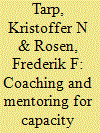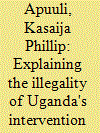| Srl | Item |
| 1 |
ID:
111538


|
|
|
|
|
| Publication |
2012.
|
| Summary/Abstract |
Coaching and mentoring for capacity' is becoming increasingly important in the state-building toolbox. If executed properly, this instrument is believed to be significantly more effective than traditional technical assistance and would consequently seem to hold great promise for the state- and peacebuilding agenda. The latest offshoot of this development is the Initiative for Capacity Enhancement in South Sudan. The initiative seeks to enhance the capacity of the South Sudanese state apparatus by deploying civil servants from neighbouring nations to coach their South Sudanese counterparts. This paper explores this particular initiative with the aim of identifying insights about designing coaching and mentoring programmes for capacity development.
|
|
|
|
|
|
|
|
|
|
|
|
|
|
|
|
| 2 |
ID:
135232


|
|
|
|
|
| Summary/Abstract |
During the night of 15 December 2013, fighting broke out between factions of the Sudan People's Liberation Army (SPLA) in Juba, the capital of the Republic of South Sudan. The fighting pitted forces loyal to President Salva Kiir against those loyal to former Vice President Riek Machar. Five days later, Uganda sent troops into South Sudan, advancing a number of reasons for intervention, including that it had been invited by the legitimate government of South Sudan to ensure order; it needed to evacuate Ugandan citizens caught up in the fighting; it had been asked by the United Nations Secretary-General to intervene; and that the regional organisation, the Intergovernmental Authority on Development had sanctioned the intervention. As the conflict escalated, Ugandan troops started fighting on the side of forces loyal to Kiir. The underlying reasons for the intervention were clearly economic, but those advanced were legal. This article discusses both sets of reasons and concludes that the economic reasons are more persuasive. Nevertheless, while some of the legal arguments (such as being invited by the legitimate government of South Sudan) can be asserted, others are clearly dubious. In addition, the participation of Ugandan troops in the fighting on the side of the Kiir government renders the intervention illegal.
|
|
|
|
|
|
|
|
|
|
|
|
|
|
|
|
| 3 |
ID:
107327


|
|
|
|
|
| Publication |
2011.
|
| Summary/Abstract |
The election of Sheik Sharif Sheik Ahmed as the transitional president of Somalia was the climax of the United Nations (UN)-led Djibouti peace process. The election, it was hoped, would herald the beginning of the reconstitution of the Somalian state. Unfortunately, nearly three years after the event, that has still not happened. The government of Sheik Sharif has faced a number of challenges which are yet to be resolved. In the end, the Djibouti peace process has not guaranteed a stable and functional national government in Somalia.
|
|
|
|
|
|
|
|
|
|
|
|
|
|
|
|